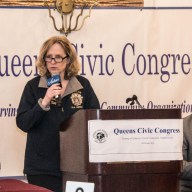By Rebecca Henely
A Long Island City woman will spend three to nine years behind bars for bilking 30 people out of their life savings, but her alleged co-conspirator is still on the run, the Queens district attorney’s office said.
Ibis Febles, 66, of 28th Street and 42nd Road in Long Island City, received her sentence from Queens Supreme Court Justice Fernando Camacho after pleading guilty in May to taking Latino residents’ money and pretending to invest it in a company that brought and sold real estate for an above-market return, the DA said.
She was charged with criminal possession of stolen property and multiple counts of grand larceny, the DA said. She also signed 30 confessions of judgment for a collective more than $1.3 million, the DA said. This means she essentially has a lien placed on her and will have to pay the debt off eventually, the DA said.
“I would therefore let this case serve as a warning to all investors to use extreme caution when promised a guaranteed and above market return of 10, 12 or 14 percent,” District Attorney Richard Brown said in a statement. “Such high rates of return should immediately cause investors to raise an alarm.”
Authorities were still looking for Giancarlo Giuseppe, 69, who allegedly enacted the scheme with Febles, the DA said.
From Sept. 30, 2003, to Oct. 1, 2008, Febles and allegedly Giuseppe operated Buyersnet Real Estate at locations in Long Island City, Jackson Heights and Elmhurst, the DA said. Febles was the vice president and Giuseppe was allegedly the principal owner, the DA said.
In exchange for money to buy, sell or fix up real estate, Febles and Giuseppe allegedly gave their victims a “Guaranteed Interest Options” certificate that entitled them to a 10 percent, 12 percent or 14 percent return on their investment, even though these rates were higher than those paid by reputable financial institutions, the DA said.
Some victims paid as much as $500 a month and lost as much as $50,000 to Febles and Giuseppe, the DA said.
Febles and allegedly Giuseppe never used the investments for real estate but to pay interest to those who had first entered into the Ponzi scheme, the DA said. The plan collapsed in 2008 when Febles and Giuseppe were not able to pay back the principles to the new investors, the DA said.
Reach reporter Rebecca Henely by e-mail at rhenely@cnglocal.com or by phone at 718-260-4564.






























